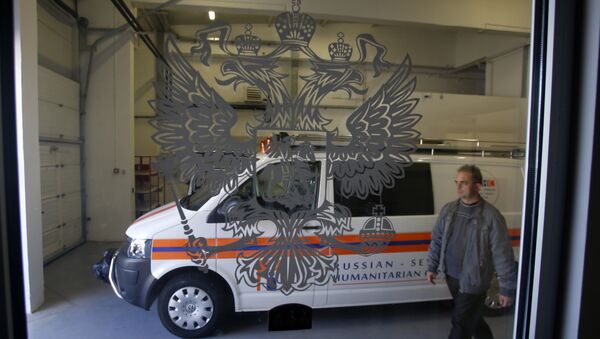The satellites in orbit monitor climate changes, seismic activity, fires and floods. The data is then collected by the spacecraft and sent to the Russian Ministry of Emergencies (EMERCOM) operations center in Moscow from where it is then relayed to the humanitarian center in Nis.
Bojan Glamoclija, the Nis center chief, told Sputnik Serbian that last year the monitoring system helped save a riverside city during a crisis situation that occurred in winter.
"With the temperature falling to minus 25 degrees Celsius, ice started rapidly accumulating in the river. With the help of the space monitoring system, the Russian specialists determined that if ice jams keep growing it may trigger a flooding that could deal colossal damage to the city with a population of 100,000. After monitoring the area, a decision was made to blow up the jams. The operation was completed successfully, which made the evacuation of the city residents unnecessary. You could say that it was a 'mission impossible,' but it was completed. And if you recall the ice jams on Danube in 2012, when a lot of boats and rafts were damaged, you can understand how important such monitoring system is to us," Glamoclija said.
He further explained that the Nis center is capable of assisting other countries in dealing with emergency situations and natural disasters. One such situation occurred last August when flooding hit Macedonia.
"We had precise information about rainfall and water levels in their rivers. Using our software we were able to determine which regions will be afflicted by flooding the most; which buildings will be flooded and which areas will require emergency assistance," Glamoclija said.
The monitoring system also proved its reliability during the recent earthquakes in Italy.
"Based on our data we can accurately predict which buildings are in danger; which structures can be rebuilt and which should be completely demolished. In only a few minutes we can fully assess a natural disaster like earthquake," Nis center head explained.
The orbital observation system is also an invaluable tool for detecting and keeping track of wildfires, he added.
At this point it remains to be seen if the EU nations will be able to overcome their suspicions and establish a meaningful cooperation with the Nis center, but people working at the Serbian facility remain optimistic in that regard – after all, politics should take a back seat when it comes to saving people’s lives.



